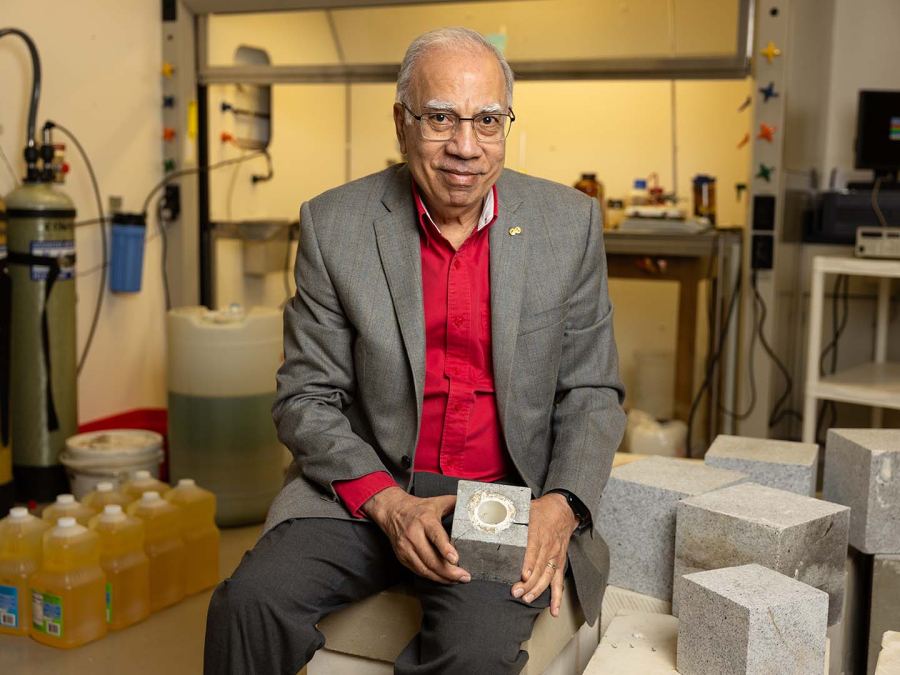For nearly seven decades, hydraulic fracturing technology has been the cornerstone of economic production from low permeability formations, unlocking vast reserves of natural gas and oil. The success of this technology relies on the collaboration of experts from various disciplines, including rock and fluid mechanics, geoscience, completion engineering, reservoir engineering and production engineering. At the forefront of this multi-disciplinary approach is Mohamed Soliman, the distinguished William C. Miller Endowed Chairman of the Petroleum Engineering Department at the University of Houston's Cullen College of Engineering.
In recognition of his illustrious 50-plus year career, Soliman has recently been honored as a member of the inaugural class of Hart Energy’s Hall of Fame and Agents of Change in Energy (ACEs). This accolade, bestowed as part of Hart's 50th-anniversary celebration, pays tribute to Soliman's exceptional contributions to the field.
Earlier in the year, he was also named a "2023 Legend of Hydraulic Fracturing" at the Society of Petroleum Engineers' Hydraulic Fracturing Technology Conference and Exhibition. This distinction, shared by only 10 other researchers, is a testament to Soliman's expertise.
His journey includes a remarkable 32-year career at Halliburton, where he played a pivotal role as the chief reservoir engineer. He initiated work in fracturing horizontal wells and was the first to implement the consideration of stress interference to design multiple fractures in horizontal wells and developed multiple original approaches to analyze fracturing tests.
His involvement in the first fractured horizontal well in the late 1980s laid the foundation for groundbreaking research in drilling, logging, fracturing, and other procedures. The results of this experiment were later shared globally.
“At the time many people thought that drilling horizontal wells would reduce or even eliminate the need for hydraulic fracturing,” Soliman said. “I thought the exact opposite. I wrote several papers between 1988 and 1990s explaining why fracturing horizontal wells is important.”
He entered academia in 2011, starting at Texas Tech, and then joined the UH Cullen College of Engineering as the first Petroleum Engineering Department chairman in 2016.
Soliman earned his doctorate in petroleum engineering from Stanford University in 1979. He has authored or co-authored more than 250 papers, two books and holds almost 40 patents, many of them in hydraulic fracturing.
Reflecting on his success, Soliman emphasized the importance of blending an academia-focused approach with industry-oriented insights.
“I always tried to marry what I learned from my own and others field experience with theory and research work,” he said. “That's what I always used in research and teaching, as well as in supervising students doing research.”
Soliman's impact extends beyond accolades and recognition. He continues to push research boundaries and inspire a new generation of engineers. He and his research team are currently focused on three key areas that promise to further revolutionize the oil and gas industry: waterless fracturing, the use of Wavelet transform for test analysis, and addressing completion issues in the production of soft formations to expand the possibilities of oil and gas extraction.
“The work that my group is currently doing has a positive impact on the environment,” he said. “For example, waterless fracturing promises to have a similar impact on the production of wells without the use of the huge amount of water that hydraulic fracturing requires. This has the potential to significantly reduce the environmental impact of well operations.”
While it’s tricky to balance research, teaching and leading a department, Soliman considers working with students is what keeps him going. “I have fantastic students that are producing great work,” he said. “We try to be directive for academic production, building new technology that can be used in the industry, not just in academia.”
In an exclusive Q&A, Soliman shares insights and principles guiding his career and life:
What is your philosophy or ‘rule of thumb’ for your life?
MS: Whatever I do has to be moral and ethical. And I put 100% into my work. I work because I enjoy my work more than money, promotions, etc., I value the sense of accomplishment and self-fulfillment.
How did you get interested in science and/or in your particular field?
MS: I always follow my interests. For example, I liked math and science and learned addition and subtraction before going to school. It was just natural and interesting to me. I found bringing oil from the underground strata so intriguing that I decided to study it.
What is one thing that people would be surprised to learn about you?
MS: I am an avid reader of comic books, history books, and science fiction.
Who is your favorite scientist/engineer?
MS: Late Professor Ramey of Stanford University is my favorite scientist. An innovator, Ramey made fundamental contributions to several areas of petroleum engineering – such as development of thermal oil recovery methods and contributions to pressure-transient well testing. He was a great professor who genuinely cared about his students.
What keeps you inspired about your work?
MS: My main motivation is developing innovative technologies for industry use and contributing to the advancement of practical technologies stemming from theoretical research.
If you could tell aspiring engineers and scientists one thing, what would it be?
MS: Learning is a lifelong goal. This has always been true, and especially true now. One cannot depend on what one learns in college to carry her/him through life. College only provides a foundation for future and continuous lifelong learning.
